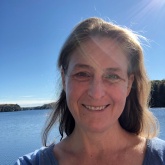Sophie Pelland

Dr. Pelland conceptualizes, conducts and supervises research on renewable energy and its large-scale integration in Canadian electricity grids.
Current research and/or projects
Dr. Pelland’s research focuses on variable renewable energy systems – solar photovoltaics and wind energy – and on the large-scale integration of these variable resources into electricity grids. Her areas of expertise include characterizing the solar resource, modelling photovoltaic systems, and developing tools and analyses to manage the uncertainty and variability associated with solar and wind energy.
Research and/or project statements
- Modeling and analyzing pathways toward net-zero greenhouse gas emissions for electricity grids in Canada
- Developing models of spectral effects in photovoltaic systems
- Assessing the technical and economic potential of photovoltaic systems in Canada
- Generating and evaluating solar and photovoltaic forecasts for time horizons of 0 to 48 hours ahead
Professional activities / interests
- Canadian representative within the International Energy Agency Photovoltaic Power Systems Programme Task 16 on "Solar Resource for High Penetration and Large Scale Applications"
- Member of the Canadian review committee for the International Electrotechnial Commission (IEC) technical committee TC 82 WG2 on "Solar photovoltaic energy systems - Modules, non-concentrating"
- Member of the IEC TC82 WG2 committee drafting the IEC 61853 standard on “Photovoltaic (PV) module performance testing and energy rating"
Education and awards
Education
- PhD in Theoretical Particle Physics, Cornell, 2001
- MSc in Theoretical Particle Physics, Cornell, 1999
- BSc in Physics (Honours), McGill University, 1996
Awards
- Young Researcher Award at the 17th Photovoltaic Science and Engineering Conference, Fukuoka, Japan (2007)
- Best Paper Award at the 31st Annual Conference of the Solar Energy Society of Canada, Montreal, Canada (2006)
International experience and/or work
- Canadian representative within the International Energy Agency Photovoltaic Power Systems Programme Task 16 on "Solar Resource for High Penetration and Large Scale Applications"
- Member of international committees drafting the IEC 61724 standard on “Photovoltaic System Performance” and the IEC 61853 standard on “Photovoltaic (PV) module performance testing and energy rating”
- Co-chair of the session on solar resources and forecasting at the 2023 IEEE Photovoltaic Specialists Conference
- Senior Solar Energy Assessment Analyst at Vaisala: Modeling and research on the long-term energy yield of solar photovoltaic power plants for clients worldwide (2015-2018)
Key publications
S. Pelland and C. A. Gueymard, “Validation of photovoltaic spectral effects derived from satellite-based solar irradiance products,” IEEE J. Photovolt., vol. 12, no. 6, pp. 1361–1368, 2022.
S. Pelland, A. Gagné, M. A. Allam, D. Turcotte, and N. Ninad, “Spatiotemporal interpolation of high frequency irradiance data for inverter testing," 48th IEEE Photovoltaic Specialists Conference (PVSC), 2021.
S. Pelland, C. Beswick, D. Thevenard, A. Côté, A. Pai, and Y. Poissant, “Development and testing of the PVSPEC model of photovoltaic spectral mismatch factor,” 47th IEEE Photovoltaic Specialists Conference (PVSC), 2020.
S. Pelland, P. Pawar, A. Veeramani, W. Gustafson, L. Leahey, and A. Etringer, “Testing global models of photovoltaic soiling ratios against field test data worldwide,” 2018 IEEE 7th World Conference on Photovoltaic Energy Conversion (WCPEC), Waikoloa, USA, 2018.
S. Pelland, C. Maalouf, R. Kenny, L. Leahy, B. Schneider, and G. Bender, “Solar energy assessments: when is a Typical Meteorological Year good enough?,” American Solar Energy Society National Conference 2016, San Francisco, USA, 2016.
D. Thevenard and S. Pelland, “Estimating the uncertainty in long-term photovoltaic yield predictions,” Sol. Energy, vol. 91, pp. 432–445, 2013.
S. Pelland, G. Galanis, and G. Kallos, “Solar and photovoltaic forecasting through post-processing of the Global Environmental Multiscale numerical weather prediction model,” Prog. Photovolt.: Res. Appl., vol. 21, no. 3, pp 284–296, 2013.
S. Pelland, D. Turcotte, G. Colgate, and A. Swingler, “Nemiah Valley photovoltaic-diesel mini-grid: system performance and fuel saving based on one year of monitored data,” IEEE Trans. Sustain. Energy, vol. 3, no. 1, pp. 167–175, 2012.
S. Pelland and I. Abboud, “Comparing photovoltaic capacity value metrics: a case study for the City of Toronto,” Prog. Photovolt.: Res. Appl., vol. 16, no. 8, pp. 715–724, 2008.
D. W. McKenney, S. Pelland, Y. Poissant, R. Morris, M. Hutchinson, P. Papadopol, K. Lawrence, K. Campbell, “Spatial insolation models for photovoltaic energy in Canada,” Sol. Energy, vol. 82, no. 11, pp. 1049–1061, 2008.
S. Pelland and Y. Poissant, “An evaluation of the potential of building integrated photovoltaics in Canada,” 31st Annual Conference of the Solar Energy Society of Canada, Montréal, Canada, 2006.
S. Pelland, D. W. McKenney, Y. Poissant, R. Morris, K. Lawrence, K. Campbell, and P. Papadopol, “The development of photovoltaic resource maps for Canada,” 31st Annual Conference of the Solar Energy Society of Canada, Montréal, Canada, 2006.
 ORCID
ORCID